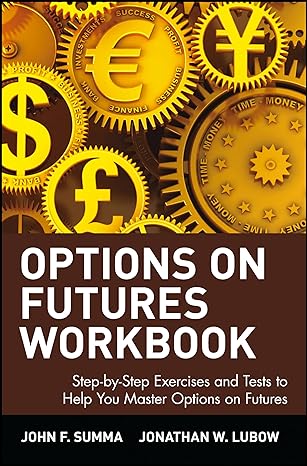Question
Adapted from the 2001 CFA Level III examination: James Stephenson, 55 years old and single, is a surgeon. He has accumulated a $2.0 million investment
Adapted from the 2001 CFA Level III examination: James Stephenson, 55 years old and single, is a surgeon. He has accumulated a $2.0 million investment portfolio with a large concentration in small-capitalization U.S. equities. During the past five years, his portfolio has averaged a 20 percent annual total return on investment. Stephensons current portfolio of $2.0 million is invested as shown in Exhibit 2-1.
| Exhibit 2-1 | Summary of Stephenson's Current Portfolio | |||
| Value | Percent of Total | Expected Annual Return | Annual Standard Deviation | |
| Short-Term Bonds | $ 200,000.00 | 10% | 4.6% | 1.6% |
| Domestic Large-Cap Equities | $ 600,000.00 | 30% | 12.4% | 19.5% |
| Domestic Small-Cap Equities | $ 1,200,000.00 | 60% | 16.0% | 29.9% |
| Total Portfolio | $ 2,000,000.00 | 100% | ||
His newly hired financial adviser, Caroline Coppa, has compiled the following notes from her meetings with Stephenson:
"Stephenson hopes that long term, his investment portfolio will continue to earn 20 percent annually. For the remainder of this year, he would like to earn a return greater than the 5 percent yield to maturity currently available from short-term government notes. When asked about his risk tolerance, he described it as average. He was surprised when informed that U.S. small-cap portfolios have historically experienced extremely high volatility. Stephenson does not expect to retire before age 70. His current annual income from his surgical practice is $250,000, which is more than sufficient to meet his current yearly expenses of $150,000. Upon retirement, he plans to sell his surgical practice and use the proceeds to purchase an annuity to cover his postretirement cash flow needs. He could not state any additional long-term goals or needs. Stephensons income and realized capital gains are taxed at a 30 percent rate. No pertinent legal or regulatory issues apply. He has no pension or retirement plan but does have sufficient health insurance for postretirement needs."
Stephenson soon expects to receive an additional $2.0 million from an inheritance and plans to invest the entire amount in an index fund that best complements the current portfolio. Coppa is evaluating the four index funds shown in Exhibit 2-2 for their ability to produce a portfolio that will meet the following two criteria relative to the current portfolio:
| Exhibit 2-2 | Index Fund Characterisitcs | ||
| Value | Percent of Total | Expected Annual Return | |
| A | 15% | 25% | 0.80 |
| B | 11% | 22% | 0.60 |
| C | 16% | 25% | 0.90 |
| D | 14% | 22% | 0.65 |
1. Maintain or enhance expected return. 2. Maintain or reduce volatility.
Each fund is invested in an asset class that is not substantially represented in the current portfolio.
A. Formulate the following elements of Stephensons investment policy statement and justify your response for each element with two arguments:
i. Return objective ii. Risk tolerance iii. Liquidity requirements iv. Time horizon
B. State which fund Coppa should recommend to Stephenson. Justify your choice by describing how your chosen fund best meets both of the criteria set forth by Coppa. (No calculations are required.)
Step by Step Solution
There are 3 Steps involved in it
Step: 1

Get Instant Access to Expert-Tailored Solutions
See step-by-step solutions with expert insights and AI powered tools for academic success
Step: 2

Step: 3

Ace Your Homework with AI
Get the answers you need in no time with our AI-driven, step-by-step assistance
Get Started


